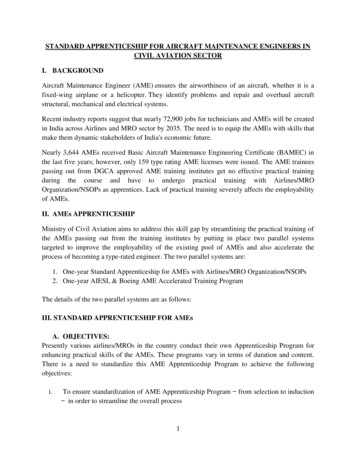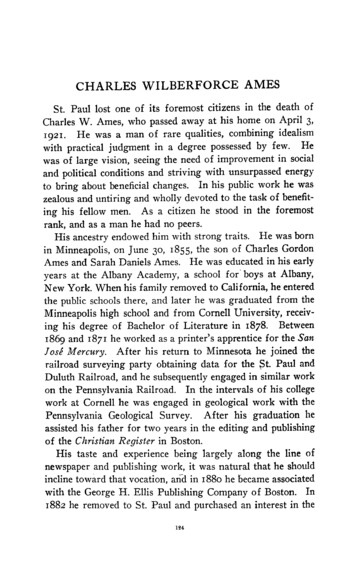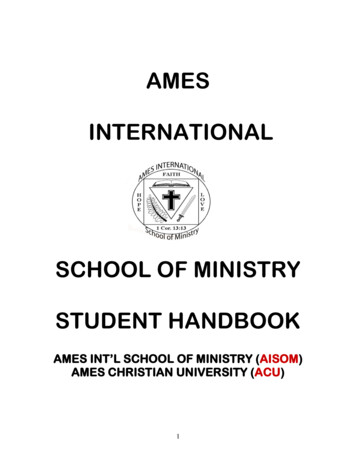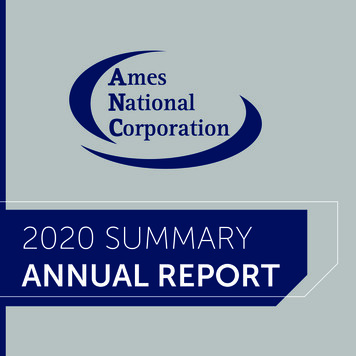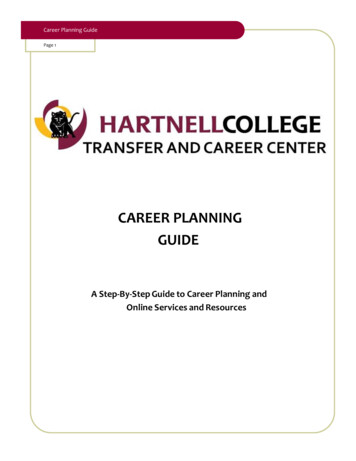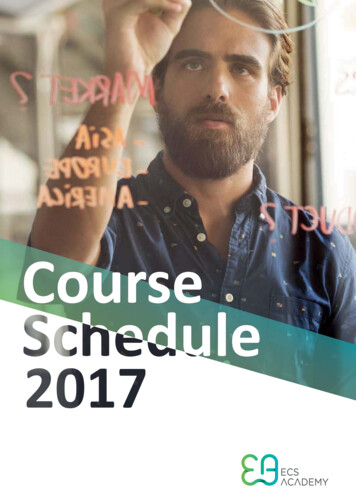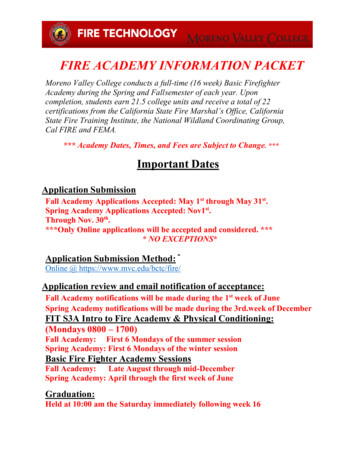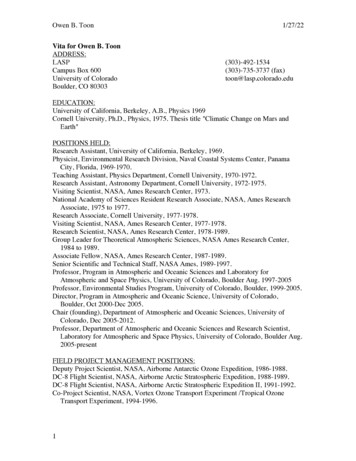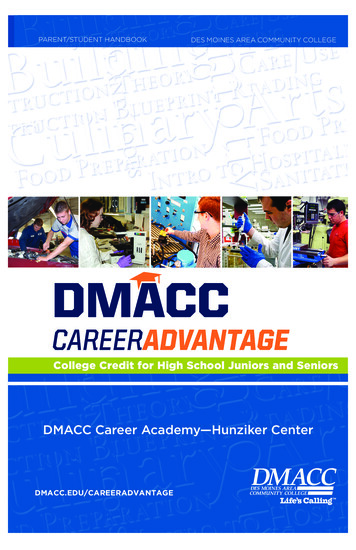
Transcription
PARENT/STUDENT HANDBOOKDES MOINES AREA COMMUNITY COLLEGEDMlccCAREERADVANTAGECollege Credit for High School Juniors and SeniorsDMACC Career Academy—Hunziker CenterDMACC.EDU/CAREERADVANTAGEDMACCDES MOINES AREACOMMUNITY COLLEGE-Life's Calli.DI!'"
PURPOSEThe purpose of this handbook is to provide backgroundinformation and address the specifc rules, policies, andprocedures pertinent to high school students enrolled inthe Career Advantage program and the DMACC CareerAcademy—Hunziker Center in Ames.WHAT ISCAREER ADVANTAGE?Career Advantage is a partnership between Des MoinesArea Community College and area high schools thatenables students to complete college-level courseswhile still enrolled in high school Career Advantageprogramming is authorized by Iowa Code 282.26.u Career Advantage courses supplement highschool courses.u DMACC course competencies, course materials,and textbooks are used in the classroom.u Courses are the same content and quality as coursestaught on the college campus.u All instructors meet DMACC instructor qualifcations.WHAT IS A CAREER ACADEMY?Career Academy programs are specifc programs thatintroduce high school students to career/vocationalprogram opportunities. College credits earned can leadtoward a specifc program completion certifcate orlicense, college diploma, or two-year Associate’s Degree.CULINARY ARTS Through hands-on experience,students are introduced to the scientifc principles usedin food preparation, the hospitality industry, and thefundamentals of dining and sanitation. In the CulinaryArts Academy, 12 credits are available upon completionof all culinary course oferings.2AUTO COLLISION REPAIRStudents will gain experience in theareas of basic shop operations andprocedures, welding, painting, and shopsafety. Twenty-seven DMACC credits areavailable upon completion of all DMACCCareer Academy course oferings.
DMACC CAREER ADVANTAGEOFFERS THREE OPTIONS FORHIGH SCHOOL STUDENTS:uuuWHY CONSIDERCAREER ADVANTAGE?Classes at DMACC—Located on on our campuses andattendance centers, DMACC Career Academies oferscareer and options and get a head start on college.u High school students earn collegecredit and college experienceat no cost.Classes at your high school — DMACC ofers a varietyof courses within area high schools. These coursesare taught by high school instructors who have beenapproved and certifed by DMACC. DMACC courseoferings vary at each high school.u Programs and courses lead directlyto degrees, diplomas, certificates,and apprenticeships.Classes online — The DMACC Online Career Academy(OLCA) provides high school students the opportunityto take a college class at DMACC through an onlineenvironment. DMACC provides a variety ofcourse options.STUDENT ELIGIBILITY REQUIREMENTS FORCONCURRENT ENROLLMENT COURSESTo be eligible for a concurrent enrollment course,students must be a high school junior or senior in goodacademic standing. They must also be on track tograduate on time and demonstrate a level of profciencyin Reading, Math, and Science as determined by theirperformance on the Iowa Assessments. Local districtsmay approve student participation for students who fallshort of profciency in these three areas through the useof an alternate assessment criterion.u Students gain hands-on training inan area of personal interest.u Career and technical programs givestudents excellent opportunities toexplore career options before theyleave high school, without requiringan investment in postsecondaryprograms they may ultimatelynot pursue.u The college credits earned applytoward a two-year degree atDMACC.u Career and technical programs areequipped with state-of-the-arttechnology.u Students enter the workforce withmarketable skills.u Students save time and money withan early start on college.ADDITIONAL INFORMATIONTuition: Tuition for students enrolled in Career Advantage programsis paid by the local school district. On average, a student enrolledin a Career Academy program completes 12 credits in a school year,resulting in a savings of more than 1,750 in tuition costs. Highschools are billed each semester for Career Advantage courses inwhich their students are enrolled.Course Textbooks and Materials: All textbooks, classroom materials,and tools required for the respective programs/courses are provided,on loan, by DMACC to the student.College Credit: Students may use their college credit toward atwo-year degree at DMACC, or may transfer that credit to anotherpostsecondary institution. DMACC has articulation agreements withDrake, Grand View, Iowa State, Iowa, and Northern Iowa. Otherinstitutions may also honor DMACC credit. It is the responsibility ofthe student to communicate with the receiving college to decide ifand how credit will be accepted. The receiving institution makes alldecisions regarding transferability of course credits.Cancellation of Career Advantage Courses:DMACC reserves the right to decline and/or cancel any contractualagreements with secondary school systems regarding Career Advantagecourses for reasons that include, but are not limited to, the following: Limitations on available and qualifed staf Limitations on equipment Financial reasons Course found to not meet Iowa Department of Educationrequirements Course does not meet DMACC content, time requirements, or rigor Any other reason as determined by DMACC to not be in the bestinterest of the College3
DMACC Career Academy ProgramsProvided at the Hunziker CenterTo learn more about these Career Academy program opportunities,visit www.dmacc.edu/careeradvantageProgramYear 1CreditsYear 2CreditsTotalProgramCreditsAdditional College SemestersRequired to CompleteCollege Diploma ProgramCollege Semesters Requiredfor Diploma Without CAProgram CompletionAuto Collision*15Automotive Technology*1211Building Trades*1292123Criminal Justice161634Culinary Arts*1414Health Occupations1414Receive Certifcation as CertifedNurse Aide upon successfulcompletion of state exam.Successful completion satisfestwo program entry requirementsfor several health programsTeacher Academy88Courses fulfll Level I FieldExperience Requirement atmany four-year colleges.Welding1010Upon successful completion ofthis program, students may beeligible to earn college-levelcertifcates in Blueprint Readingand Production Mig Welding2—Diploma4—Associate ofApplied Science233—Diploma5—Associate ofApplied ScienceUpon successful completionof year 1 & 2, students maybe eligible to earn acollege-level certifcate inAutomotive Minor Repairand Vehicle Maintenance* The college credits earned automatically qualify students for program continuation on the DMACC campus—no waitinglist for students to be enrolled in some of these programs.To learn more about these Career Academy program opportunities, visit www.dmacc.edu/careeradvantageAdditional information about the Programs of Study, career opportunities, potential pay rates, and other topics can befound at ge
Hunziker Career AcademyPolicies and ProceduresATTENDANCE/TARDY POLICYStudent attendance is very important. Classes meet each day for two hours and missing one ormore classes can easily cause a student to fall behind. Students who are going to be absent fromclass must contact the instructor directly (instructors will provide contact information) to let themknow of the impending absence. Attendance records are maintained daily and the local highschool is contacted with a daily attendance report. It is the student’s responsibility to meet with theinstructor to learn about classroom assignments and content information that was missed duringthe absence.STUDENT RESPONSIBILITIESStudents enrolled in Career Academy programs are expected to:u Assume responsibility for their learning and achievement.u Demonstrate respect for fellow classmates, instructors, and school property and equipment.u Make a commitment to attend classes and give their best efort each day.u Communicate with their instructors if they are absent from class.u Assume responsibility for completing any makeup work required as a result of an absencefrom class.WEATHER-RELATED POSTPONEMENTS/CANCELLATIONSPoor weather conditions may require postponement or cancellation of classes. Depending onthe nature of the weather conditions, classes may be postponed for the morning session only ormay be cancelled for the entire day. Every efort will be made to make a decision by 6:00 a.m. Allinstructors have organized either a phone tree or a text message list and will communicate anypostponement or cancellation directly with students. A voice message will also be posted on theHunziker Center answering machine, (515) 663-6700. In the event that DMACC is in session, but thelocal high school is not in session due to weather conditions, the parent and student will make adecision about attendance on that day. On occasions when weather deteriorates during the schoolday, school principals can make the decision not to have their students attend the Academy if theyfeel it is unsafe for them to travel. The local schools will contact the Academy if their students willnot be attending.ACADEMIC CALENDAR DATESThe academic calendar for Career Academy programs is established by DMACC and can be foundonline at www.dmacc.edu/students. Students are expected to attend classes when they are insession. On days when DMACC is not in session, but the student’s high school is, students areexpected to attend their regularly scheduled high school classes. The Career Academy staf willwork with local high school administrators when special schedules occur that may require studentsto miss part of the school day at either the Career Academy or at the local high school.5www.DMACC.edu/careeradvantage
Hunziker Career AcademyPolicies and ProceduresPROCEDURES FOR PARENTS SEEKING INFORMATIONDMACC will comply with the Family Educational Rights and Privacy Act (FERPA) mandated bythe U.S. Congress as it pertains to student records. Parents who seek specifc information aboutstudent work/achievement from an instructor should direct their questions to a Career Academyadministrator, who will communicate with the instructor, gather the requested information (e.g.,information about student progress, grades, work habits, work completion, attitude in class, etc.), andforward this information to the high school counselor. The Career Academy has a signed agreementwith all local high schools to share student information in this manner.GRADESGrading scales and criteria for coursework should be specifed in the course syllabus and willbe reviewed with students by the individual program instructors. Some programs have specifcperformance standards that must be attained for students to demonstrate profciency.GRADE REPORTINGProgress Grade Reports are distributed to the high school counselor three times per semester. At leastone of the progress reports is provided prior to mid-semester and the deadline for dropping classes.This report notifes students who have quit attending or are not progressing satisfactorily (receivinggrades of C- or lower) of services available to help them improve their academic performance.Ofcial Final Grade Reports are issued from the DMACC Ofce of Academic Records in mid-Februaryand in late June. Upon completion of Career Advantage courses, students earn permanent gradesthat appear on an ofcial college transcript. Final grade reports are available to Career AdvantageStudents by signing into their MyDMACC account. A copy of the fnal grade report is also fled withthe local high school counselor.TRANSPORTATION AND PARKINGStudents enrolled in Career Academy programs at the Hunziker Center are responsible for theirown transportation to and from the Center. Many students from the same district car-pool together.Students enrolled in the Building Trades program and Certifed Nurse Aide program are responsiblefor their own transportation to and from their job site or clinical experiences. Adequate parking isavailable at the Hunziker Center for students attending classes. Students are asked to park within themarked parking stalls.ADD/DROP POLICYStudents may change their schedule by contacting a Career Advantage Academic Advisor. Studentsmay drop/withdraw from courses up until the ofcial Drop Deadline date (set by the DMACCRegistrar’s Ofce). In order to drop a class, students must complete an ofcial add/drop form.NOTE: High school students should be aware that if they are taking a college course for concurrent credit and decideto drop the class, they must also drop the high school credit. This could have an impact on the number of credits astudent will need for high school graduation. Prior to being approved for dropping a program/course, students mustcommunicate with both their local high school counselor and the DMACC academic advisor. Students must alsoconsult with their high school counselor to review high school graduation requirements and verify their high schoolcredit status.6
Hunziker Career AcademyPolicies and ProceduresACADEMIC ADVISOR SERVICESAn Academic Advisor is available on-site to assist students in planning their educational programs,monitoring their academic progress, developing their academic skills, using college resources tomeet their educational needs, and meeting graduation requirements. The Advisor will also visitlocal high schools to provide support and information regarding DMACC programs, credit andtransfer procedures, and any other student educational needs.IEP SERVICESDMACC will provide reasonable accommodations to support students with disabilities. Modifcationsthat alter the curriculum or the academic expectations for students are not permitted. In theCareer Academy setting, DMACC and the home high school will collaborate to ensure properservices are provided. The following list represents common or frequent accommodations usedby students with disabilities in DMACC programs. It is not intended to be a comprehensive list ofpossible options.TYPES OF ACCOMMODATIONS:1. Taped/Scanned Textbooks2. Testing Accommodations3. Readers and Scribes4. Software5. Sign Language Interpreters, as arranged by the district.6. Alternate Formats (Braille, Large Print, Closed Captioning)7. Notetakers8. Digital Recorders and Assistive Listening DevicesIf a student enrolled in programs requires specifc one-on-one instructional support, the localschool district assumes responsibility for providing this support.ACADEMIC INTEGRITYAcademic Integrity (doing one’s own work in course assignments and on tests) is one of the mostimportant values in higher education. Receiving credit for plagiarizing or cheating diminishesthe value of all degrees conferred. It is unacceptable for students to submit another person’swork as their own. If students quote, summarize, paraphrase, or use an author’s idea, they mustacknowledge the source; otherwise they are plagiarizing. Allowing others to accept credit for worknot their own is also cheating. Students who plagiarize or cheat will be held accountable by theirinstructor and are subject to the sanctions outlined in the Academic Misconduct Procedure (ES 4670).7www.DMACC.edu/careeradvantage
Hunziker Career AcademyPolicies and ProceduresCONFIDENTIALITY REQUIREMENTSDue to their placement in a work environment with potential access to a wide variety of information,students enrolled in the Health Occupations program are required to complete confdentialityagreements for their respective worksites and clinical experiences. These agreements will be providedto the student and must be completed before placement in a work or clinical experience can begin.IMPACT OF LOW GRADES/DROPS/WITHDRAWALSON FUTURE FINANCIAL AIDA student’s college transcripts become a part of each student’s permanent record. As such, it isimportant to give your very best efort at all times and keep the doors of opportunity open andavailable to you. Low grades, drops, and withdrawal from programs can afect your eligibility for futurefnancial aid.TRANSFER OF CREDITSStudents considering transfer to another college or university should contact an admissions or transfercounselor at that institution early in the planning process. The following outline provides tips for asuccessful transfer:u Research and visit four-year colleges as soon as possible to decide on a transfer college. DMACCofers many partnership programs with four-year colleges and universities. For more information,visit spxu Schedule a campus visit as soon as possible with any institutions you may be considering. Whenscheduling a visit, ask for an appointment with an advisor. Write down the names of contact peopleat the transfer college.u Complete an application for admission to the selected college or colleges. Complete fnancial aid,scholarship and housing applications. Watch for deadlines and complete all materials as earlyas possible.u Request to have all college transcripts sent to the transfer college. Students must contacteach college attended and request that they release all academic transcripts to the selectedtransfer college.u Attend a registration/orientation day at the transfer college. Some colleges allow students topreregister for classes. Be alert to any registration/orientation procedures and stay in touch with thetransfer college.TRANSCRIPT REQUESTSStudents can mail or fax requests to the DMACC Ofce of Academic Records. Transcript request forms areavailable at each campus, from a Career Advantage advisor, or at this website: www.dmacc.edu/careeradvantage.Career Academy transcripts are sent at the end of February and end of June There is no fee for transcripts. Copiesof transcripts issued to students are stamped with the words “Issued to Student.”Once grades are posted at DMACC, transcripts can be sent electronically through the National StudentClearinghouse. Please see the DMACC Academic Records webpage for more information.8
Hunziker Career AcademyPolicies and ProceduresLOST AND FOUNDLost or misplaced items are turned in to the building administrative assistant and can be claimedat this desk.TOBACCO-FREE CAMPUSAll DMACC campuses are tobacco-free. Tobacco is defned to include any lit cigarette, cigar, pipe,bidi, clove cigarette, and any other smoking product; and smokeless or spit tobacco, also knownas dip, chew, snuf or snus, in any form. Engaging in smoking tobacco products or using smokelesstobacco products while on DMACC property is prohibited. This policy applies to:a) All DMACC campuses, attendance centers, and anywhere that DMACC provides aservice (e.g., rental facilities).b) Housing owned by DMACC or situated within the boundaries of a DMACC campus.c) No DMACC location is exempt. This includes personal vehicles located on DMACCproperty, DMACC vehicles, walking trails, and outdoor athletic complexes.Sanctions for violation of this policy may include a letter of reprimand, disciplinary conferencewith administration, and a monetary fne.DRUG-FREE SCHOOLS AND CAMPUSES ACTDMACC strives to provide an educational environment that promotes the health and safetyof students, faculty, and staf. Accordingly, DMACC complies with the Drug-Free Schools andCampuses Act. The following behaviors are prohibited:u Using, possessing, misusing, or being under the infuence of any alcoholic beverage or otherintoxicating beverage on College property or at College-sponsored functions, except asauthorized by College regulations or College authority.u Manufacturing, processing, selling, delivering, providing, using, purchasing, or misusing orpossessing any narcotic drug, marijuana, or other addictive, dangerous, or controlled substanceon College property or at College-sponsored functions. Drug paraphernalia is also prohibited.u The use of tobacco products, which include smokeless or smoking tobacco, is prohibited on allcampuses and all attendance facilities in compliance with state law.The unlawful possession, use, distribution, or misuse of illicit drugs or alcohol by students mayresult in sanctions including suspension from DMACC. More information about the DMACC StudentConduct Code and possible sanctions can be found at: advantage
NotesHEALTH OCCUPATIONSThis year-long programwill provide students theopportunity to explorecareers in healthcare andwork toward CNA training.10
WELDINGIn addition to a weldingskill base, students willexplore the greatercareer feld of advancedmanufacturing throughworkplace experience.Ten credits are availableupon completion of allDMACC Career Academycourse oferings.11
CONTACT INFORMATIONCAREER ACADEMYJEFF KELLYDIRECTOROfce: 515-663-6708 or800-362-2127, ext. 6708email: jjkelly@dmacc.eduMEGAN WICKSACADEMIC ADVISOROfce: 515-663-6707800-362-2127, ext. 6707email: EERADVANTAGEADMISSIONS515-965-7337 or800-362-2127, ext. 7337TESTING CENTER (Ames)515-663-6700 or800-362-2127, ext. 6700INFORMATION CENTER (Ames)515-663-6700800-362-2127, ext. 6700TRANSCRIPT REQUESTS515-964-6396 or800-362-2127, ext. 6396DMACCDES MOINES AREA- COMMUNITY COLLEGHLife's Calling··13358-6-20-CC-MDes Moines Area Community College (DMACC) shall not engage in nor allow discrimination covered by law against any person, group or organization. This includes in itsprograms, activities, employment practices, hiring practices or the provision of services. The full DMACC Nondiscrimination policy is available online at nd.dmacc.edu.
In the Culinary Arts Academy, 12 credits are available upon completion of all culinary course oferings. AUTO COLLISION REPAIR . Students will gain experience in the areas of basic shop operations and procedures, welding, painting, and shop safety. Twenty-seven DMACC credits are available upon completion of all DMACC Career Academy course .

